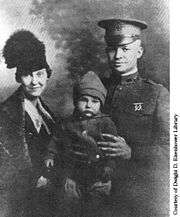Doud Eisenhower
| Doud Dwight Eisenhower | |
|---|---|
|
| |
| Born |
September 24, 1917 San Antonio, Texas, U.S. |
| Died |
January 2, 1921 (aged 3) Camp Meade, Maryland, U.S. |
| Cause of death | Scarlet fever |
| Known for | First son of 34th president of the U.S. , Dwight D. Eisenhower |
| Parent(s) |
Dwight D. Eisenhower Mamie Eisenhower |
Doud Dwight "Icky" Eisenhower (September 24, 1917 – January 2, 1921) was the first son of Dwight D. Eisenhower and Mamie Eisenhower. He was named "Doud" in honor of his mother (her maiden name was Doud) and "Dwight" in honor of his father. He was commonly called "Icky" amongst his family members.
Early life
Icky was the first son of future-president Dwight D. Eisenhower and his wife Mamie Eisenhower. He was born on September 24, 1917 in San Antonio, Texas. He and his mother moved to Denver, Colorado while his father was stationed at Camp Meade in Maryland.[1] Regarding Dwight's family contacts while on the U.S. Army's 1919 Transcontinental Motor Convoy, biographers Lester and Irene David wrote:
He called Mamie several times a week [while on the convoy], beginning each call with requests for news about Icky. How was he growing? What new mischief had he gotten into? Once Mamie interrupted with, "Listen here . . . how about asking how your wife is?" Ike was chastened; he chatted for a moment about Mamie, but soon turned the conversation to Icky again. Mamie gave up.[1]
Death
After he and his family relocated to Fort Meade in Severn, Maryland, his mother hired a sixteen-year-old local girl as a maid. The girl had been recovering from scarlet fever.[1] In December 1920, shortly before Christmas, Icky caught scarlet fever from the girl.[1] Though his mother tried desperately to save him, even calling a specialist from Johns Hopkins Hospital in Baltimore,[1] Icky died on January 2, 1921. His father then referred to this incident as "the most shattering moment of their lives, one that almost destroyed their marriage".[1] Mamie and Dwight blamed themselves for Icky's death; had they checked the girl's background, they would have found out that the girl had scarlet fever. In his biography of Eisenhower, Stephen E. Ambrose wrote:
These feelings had to be suppressed if the marriage was to survive the disaster, but suppression did not eliminate the unwanted thoughts, only made them harder to live with. Both the inner-directed guilt and the projected feelings of blame placed a strain on their marriage. So did the equally inevitable sense of loss, the grief that could not be comforted, the feeling that all the joy had gone out of life. "For a long time, it was as if a shining light had gone out in Ike's life," Mamie said later. "Throughout all the years that followed, the memory of those bleak days was a deep inner pain that never seemed to diminish much."[1]
Family tree
| |||||||||||||||||||||||||||||||||||||||||||||||||||||||||||||||||||||||||||||||||||||||||||||||||||||||||||||||||||||||||||||||||||||||||||||||||||||||||||||||||||||||||||||||||||||||||||||||||||||||||||||||||||||||||||||||||||||||||||||||||||||||||||||||||||||||||||||||||||||||||||||||||||||||||||||||||||||||||||||||||||||||||||||||||||||||||||||||||||||||||||||||||||||||||||||||||||||||||||||||||||||||||||||||||||||||||||||||||||||||||||||||||||||||||||||||||||||||||||||||||||||||||||||||||||||||||||||||||||||||||||||||||||||||||||||||||||||||||||||||||||||||||||||||||||||||||||||||||||||||||||||||||||||||||||||||||||||||||||||||||||||||||||||||||||||||||||
Posthumous actions

On January 7, 1921, less than a week after his death, Icky was buried in Fairmont Cemetery in Denver, Colorado.[1] Lester and Irene David said:
Forty-five years later Eisenhower, by then a national hero, flew to Abilene in an unpublicized trip. Dressed in a charcoal-gray suit, his deeply lined face pale and taut, Ike stood bareheaded as the body of little Icky, taken from Fairmont Cemetery, was reburied beneath the marble floor of the little thin-spired chapel of buff-colored stone on the grounds of the Eisenhower Center.[1]
After this, he was moved to the Eisenhower Presidential Center. His parents were buried next to him. In 1967, Eisenhower would look to Icky's death as "the greatest disappointment and disaster of my life, the one I have never been able to forget completely".[1] For the rest of their lives, Dwight would send Mamie flowers on Icky's birthday each year.[1]
References
External links
Account of Icky's death at the Federal Highway Administration website
Books
- Ambrose, Stephen Edward (1990). Eisenhower: Soldier and President. New York: Simon & Schuster. ISBN 0-671-70107-X.
